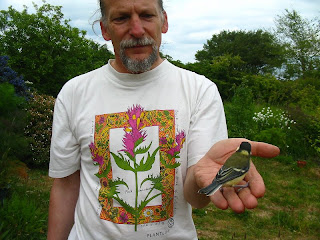From the very beginning of the TN blog, Reconnection with Nature has been the most frequently used label to describe our posts. Two recent pieces, John's Toads Talk Transport and Charlotte’s The Sea Kale Project, give voice to how the natural world is present in our lives in a way that goes beyond nature as mere entertainment, a backdrop for our life-dramas, a nice view or something that’s, well there, but that we don’t take too seriously or want to keep under control at all costs.
Perhaps the most pernicious attitude towards the natural world in present times is nature as endlessly exploitable resource. Nature that we can simply extract from (think tar sands, see Gasland, read about Water Matters) to keep a certain high energy, high carbon, superficial and disconnected (see deep economist Bill McKibben's latest article) lifestyle going. One that pollutes the very planet we depend on for our lives. With no regard for the places, people, plants, animals, forests, mountains or seas that suffer in the process.
For me, Deep Nature is an attitude, an approach, more to do with tuning in and being open and aware of the connections and interdependency between things, than about sitting on a pristine mountaintop (one that hasn’t been open-top mined) in splendid isolation. Although that too may be useful sometimes. We can start right where we are. Right at home. I started in the 90s getting to know the wild and medicinal plants outside my door in the city. That was when I began to feel at home after years of travel. Years later I began planting seeds myself. Then last year I turned my attention to bees and pollination properly for the first time, when I joined Bungay Community Bees.
Being open and aware is not a fixed state you achieve and that’s that. It happens at a certain depth and tempo which is at odds with the mechanical rush of modern life which all of us are more or less subject to. Sometimes it happens almost by grace, like the day recently that bees, people, plants and place converged in Bungay.
 Or when a schoolchild asks you if the sunflower seeds you’re showing them how to plant so the flowers can feed the bees are ‘awake’.
Or when a schoolchild asks you if the sunflower seeds you’re showing them how to plant so the flowers can feed the bees are ‘awake’.Or when a fledgling Great Tit stuns itself against your window and you hold it in your hand whilst it gets back its bearings and returns to itself.
But mostly it’s something we have to get into, negotiate. That takes effort. And practice. And it comes from a deep feeling for what's at stake if we don't.
Pics: Great Tit fledgling recovers its bearings in my hands; sunflower seeds, seedlings, dried head, Elinor's recycled paper pots and suma sunflower spread at Bungay primary school - both by Mark Watson








I enjoyed Mark's notion of 'negotiation' - an on-going process of working at relationships with both the natural and the social world. The two are surely inter-connected - when Mrs Thatcher famously said there is no such thing as society, she implied that we are all 'just individuals' whereas we are - or are most content when being - individual yes but also social beings benefitting from and enhanced by relationships, re-worked and negotiated, not wasted or thrown away and discarded. So too with material things and with food and with the rest of our environment.
ReplyDeleteHaving grown up in post-war austerity I was familiar from an early age with the creativity and pleasure of 'making do' and 'recycling'. I still have my grandmother's old wooden bread plattter with 'waste not, want not' in cursive around the edge. Also in all of my travels in Africa and Asia I have been impressed by thew way in which nothing is wasted, but once at the end of its life is re-worked and recycled to become something else of use.
re- is a good start (re-construction, re-habilitation, re-storation, re-creation, re-lationships, re-sponsibility, re-volution?)
david